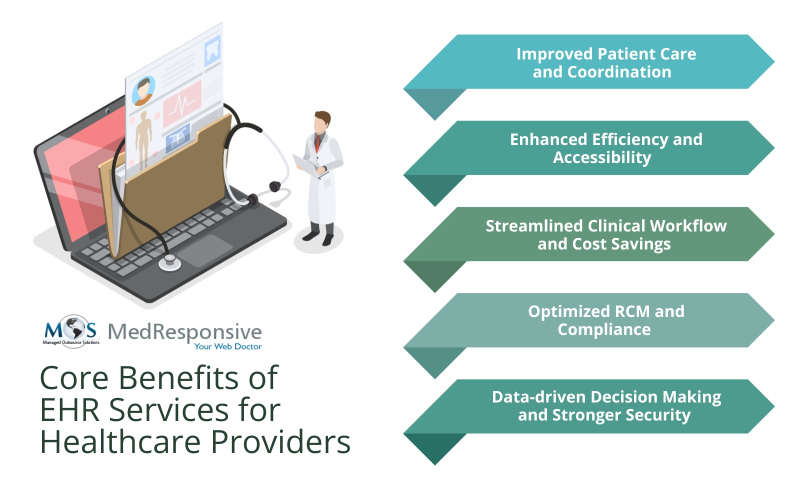Scientific advancements and technological innovations are rapidly transforming the healthcare landscape, profoundly influencing clinical processes, performance, and overall care quality. Among the most pivotal developments in this progress is the adoption of Electronic Health Record (EHR) systems. By integrating EHR systems into healthcare networks, medical practices can optimize their workflows, make informed decisions, and improve patient outcomes.
What Are Electronic Health Records?
Electronic or digital health records (EHRs) are digital repositories used by healthcare providers to store, access, and manage patient medical data. This virtual patient data management system acts as a real-time, centralized hub for handling medical records by authorized personnel. EHR platforms play an indispensable role by facilitating efficient, up-to-date, and secure access to patient information. Through continuous advancements in EHR application development, healthcare providers are able to further streamline workflows, improve data accuracy, and deliver more personalized patient care. A typical EHR may contain patient data such as:
- Demographic information
- Medical history
- Prescriptions and medications
- Diagnoses and immunization dates
- Lab results and radiology images
- Treatment plans
- Billing codes
The widespread adoption of EHR systems has revolutionized the healthcare sector, enhancing communication, reducing errors, and streamlining administrative tasks, ultimately leading to better patient care and more efficient healthcare delivery. Healthcare facilities seeking to realize the aforementioned objectives can utilize EHR solutions ensure they are equipped to deliver exceptional care and bolster the financial strength of their organization.
Key Advantages of EHR System
Understanding the key benefits of using EHR systems in healthcare practices will help select a holistic solution that reduces errors, lowers healthcare costs, and ultimately leads to better patient outcomes.
- Improved Patient Care and Coordination
EHR systems help healthcare providers overcome common challenges associated with traditional paper records, such as incomplete patient histories, miscommunication, and delays in care. By choosing the right vendor to implement and manage advanced electronic health records, healthcare organizations can streamline patient information management. EHRs centralize patient data, providing real-time, comprehensive updates that improve patient care and coordination across multiple care providers. This centralized approach facilitates seamless communication between healthcare professionals, specialists, and medical facilities, allowing for a more personalized and coordinated care experience.
- Enhanced Efficiency and Accessibility
EHR systems significantly improve the efficiency of medical practices by eliminating the repetitive, time-consuming administrative tasks associated with paper-based records. By automating functions like appointment scheduling, insurance verification, and prescription management, healthcare facilities can reduce human error, enhance productivity, and streamline operations. Additionally, EHR systems provide authorized, professional unified access to patient information, improving workflow and enabling better decision-making. The enhanced accessibility is especially valuable in emergency situations, allowing providers to deliver high-quality care regardless of their location.
- Streamlined Clinical Workflow and Cost Savings
EHR services streamline clinical operations with automation, interoperability, and data centralization. It helps improve the overall workflow of healthcare teams, allowing them to focus more on patient care rather than administrative tasks. With EHRs, healthcare providers can quickly retrieve patient histories, lab results, and medication records, enabling faster decision-making and reducing the likelihood of errors. Furthermore, the automation of complex tasks leads to significant cost savings by reducing the need for physical storage, preventing duplicate tests, and decreasing the time spent on administrative processes. In the long term, these efficiencies not only improve operational performance but also reduce overhead costs for medical practices.
- Optimized RCM and Compliance
By streamlining the entire clinical and administrative process involved in patient encounters, healthcare organizations can optimize their revenue cycle management (RCM) systems. EHR software plays a key role in standardizing RCM by reducing errors in documentation, billing codes, and claims. This reduces the likelihood of denials, rejections, and delays, ensuring faster claims processing and timely reimbursements. Knowing how EHR systems help with healthcare compliance and billing accuracy is crucial. They ensure that billing practices adhere to industry regulations. Utilizing EHR platforms for billing purposes not only boosts financial viability but also enhances compliance with industry regulations, helping to avoid costly penalties and improve operational efficiency.
- Data-driven Decision Making and Stronger Security
In a world where data-driven decision-making is becoming the norm, implementing EHR software can be the solution for effective data analysis. EHR systems have built-in tools for data analytics and reporting, enabling healthcare entities to gain valuable insights about their operations and financial performance. By aggregating data from multiple sources, healthcare providers can monitor key performance metrics such as denial rates, net collection rates, and days in accounts receivable. Moreover, EHR systems strengthen patient data security by implementing stringent encryption, access controls, and audit trails, safeguarding sensitive information from breaches and unauthorized access. This not only ensures compliance with regulatory requirements but also fosters patient trust and confidence in the system’s security.
Critical Factors to Consider When Selecting EHR Platforms
Choosing the right EHR platform is a pivotal decision for healthcare organizations as it can significantly impact their practice workflow, RCM efficiency, and overall revenue flow. With a multitude of EHR vendors in the market, selecting the ideal service can be a challenging process.
Here are the critical factors to consider when picking the best fit for your practice:
- Practice Size and Needs – Begin by assessing your practice’s current size, specific needs, requirements, and goals. Whether you run a small practice or a multi-location healthcare network, outlining your unique objectives is necessary to select a service best suited to the internal operations and budget. This step not only helps you understand the current challenges but also identifies opportunities that a new EHR system can address for the growth of your practice.
- Research Vendors – Conduct thorough research on different EHR vendors by looking at customer reviews, industry ratings, and case studies to gauge the performance of each vendor. Pay attention to their track record in terms of customer satisfaction, product reliability, and ongoing support. Solicit feedback and reviews from peers in your healthcare network. Comparing multiple vendors will give you a clearer understanding of which one offers the best combination of features, pricing, and support for your practice’s goals.
- Pricing Structure – Visit the potential vendor’s website or request an estimate to explore the different pricing models such as subscription cost or one-time payment. Assess the complete cost of ownership including initial expenses, maintenance fee, and ongoing operational prices. Keep in mind that while the overall expense of integrating EHR may have heavy upfront costs, it produces better return-on -investment in the form of efficient billing process, reduced denials, and enhanced RCM.
- User Experience and Features – Explore the potential vendor’s website or request an estimate to understand the different pricing models, such as subscription costs or one-time payments. Assess the complete cost of ownership, including initial expenses, maintenance fees, and ongoing operational costs. While EHR integration may involve heavy upfront costs, it can yield a better return on investment through more efficient billing processes, reduced denials, and enhanced RCM.
Making a Difference: A Case Study
Transformed Legacy DOS System into a Cloud-based EHR Solution
MedResponsive transformed the client’s legacy 80s DOS-based program into QSmartCare, a cloud-based EHR solution, overcoming data management and distribution challenges.
Selecting an EHR development vendor requires careful consideration and a strategic approach to overcome any challenges that may arise during the implementation process. By taking these above factors into account, healthcare organizations can make a more informed decision. Following the given tips will help health organizations choose a reliable medical record management system that meets their needs and enhances overall operational efficiency.





